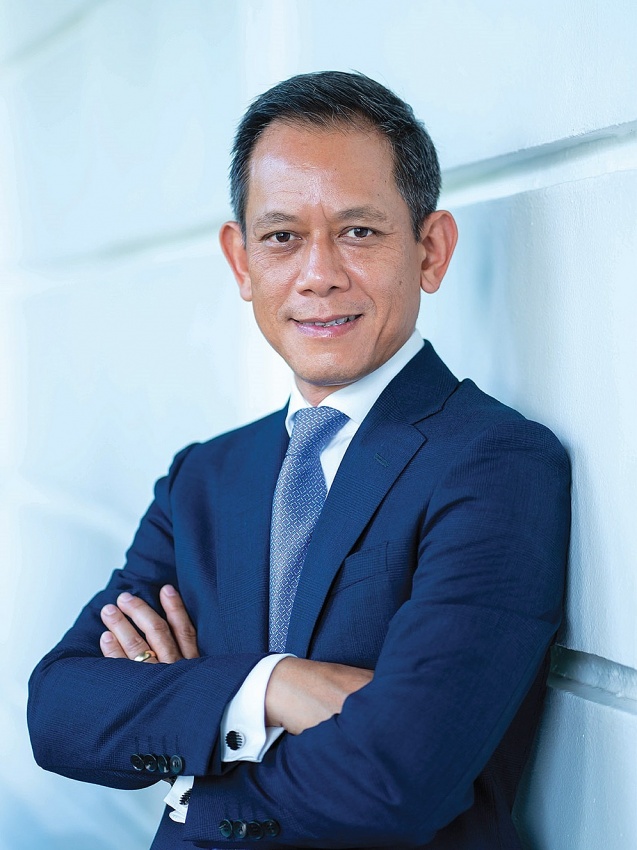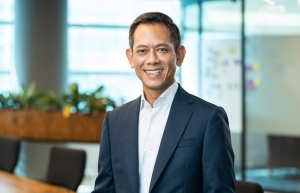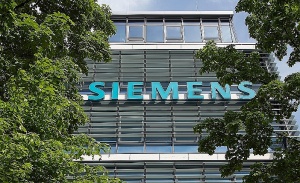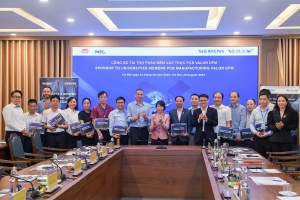Digital and sustainable actions for a better planet
In a tumultuous year of record-shattering heatwaves, wildfires, and floods, and despite rising energy prices, inflation, supply chain challenges, labour shortages, and more, we remain optimistic about technology as the answer to some of the world’s most difficult challenges.
 |
| Siemens ASEAN president and CEO Pham Thai Lai |
Our technology empowers our customers and partners to scale their sustainability impact faster across the backbone of our economies. As we approach a critical tipping point for our planet, the demand to accelerate the digital and sustainability transformations has never been greater.
Siemens supports customers all over the world to become more competitive, resilient, and, above all, more sustainable. Our portfolio enables a positive impact on our planet and society at scale. Today, it is about more than just managing negative footprints; it is about a company’s handprint and increasingly expanding businesses’ net-positive impact on the world.
That is why Siemens has integrated its sustainability strategy in our business activities, technology roadmap, decisions, own operations, and governance. We empower our customers to accelerate their sustainability goals along several impact areas: decarbonisation and energy efficiency, resource efficiency and circularity, and people centricity and societal impact.
Our purpose is to create technology to transform the everyday, for everyone. This technology with purpose touches the lives of customers, partners, and consumers everywhere – improving the quality of life for billions of people worldwide.
Technology with purpose is about leveraging digitalisation for optimised resource usage and circularity readiness and accelerating the energy transition through renewable integration, energy efficiency, and electrification.
It is about societal impact by designing and operating the most efficient train and e-mobility solutions within sustainable communities, built upon decarbonised building technologies. And it is about pioneering breakthroughs in healthcare to improve the lives of patients and their families.
Combining worlds
Our strategy is to combine the real and digital worlds – harnessing the power of hardware and software. More than 90 per cent of Siemens AG’s business enables positive sustainability outcomes for our customers.
Worth highlighting is that our products sold to customers in fiscal 2023 will, over the course of their lifetime, avoid around 190 million metric tons of CO2 equivalent emissions – a significant increase in avoided emissions over the prior year. This represents more than the equivalent emissions of the Netherlands. In contrast, our own operations and supply chain accounted for around 12 million tons of greenhouse gas emissions.
To help our customers and partners accelerate their transformation, we recently introduced Siemens Xcelerator, an open digital business platform that makes digital transformation easier, faster, and more scalable for companies of all sizes. A key element of this platform is a growing ecosystem of partners. The sustainability impact we create is more powerful when all partners pool their strengths and work together towards a common goal.
We can empower our customers to scale sustainability impact because we address challenges across the entire value chain – with deep domain know-how across many industries and across ecosystems of suppliers, partners, and customers.
An excellent example of the power of ecosystems is how software can track and manage carbon footprints throughout lifecycles and along supply chains. SiGREEN, an emissions-tracking tool on our Siemens Xcelerator platform, enables companies to connect to all their suppliers, enabling data-driven decisions to reduce product carbon footprints and decarbonise at scale.
 |
Our DEGREE sustainability framework
We do not stop at the sustainability impact of our portfolio. We define our environmental, social, and governance ambitions within our DEGREE sustainability framework – a 360-degree approach reflecting our core sustainability values. We look at sustainability from every angle with clear ambitions in six fields of action – decarbonisation, ethics, governance, resource efficiency, equity, and employability.
Siemens has a clear position on responsible business conduct and our DEGREE commitments are based on that. Ethical behaviour, integrity and compliance are nonnegotiable. They go beyond strict adherence to rules by firmly placing responsible action sustainably at the core of our culture and business conduct.
We are also focused on our own environmental footprint: In 2015, as one of the first global companies to do so, we committed to becoming carbon-neutral by 2030. Today, we are on track, and we have already accelerated. We are proud to have reduced our CO2 footprint from our operations by 50 per cent (without offsetting) since 2019 and are targeting 90 per cent in 2030. We reduced our energy consumption by 9 per cent since fiscal 2021, meanwhile 96 per cent of our locations have implemented a water strategy.
Applying our own technologies in our own operations is key to achieving these ambitions. In Nanjing, China, for example, we consolidated three production sites into one lean and green digital native factory, which was first built as a digital twin. This led to annual savings of 5 million kWh of energy, 3,300 metric tons of CO2, and 6,000 cu.m of water. At the same time, productivity went up by 20 per cent. For Siemens, rethinking scalable products and services for a sustainable world should go hand in hand with savings, efficiency gains, and customer value.
Our sustainability ambitions are supported by 320,000 colleagues who bring our purpose to life every day – in an increasingly inclusive environment in 190 countries around the world. Within Siemens AG, women now hold 31 per cent of top management roles, having achieved our 2025 ambition for 30 per cent two years ahead of time.
Our people are at the heart of this company. In fiscal 2023 we invested €416 million in our active learning culture, ensuring sustainable employability in rapidly changing markets.
We have also made progress in the number of hours our people spent learning across the three strategic focus areas of digitalisation, sustainability, and leadership. On average, our people have accrued 23 digital learning hours per person per year. And they are on track to increase that to our ambition of 25 digital learning hours in 2025.
Decarbonisation and energy efficiency
We support our customers with their efforts to decarbonise their infrastructure and operations, drive energy efficiency, and future-proof entire industries. We do this by offering products, systems, solutions, and services that are based on our strategic focus on digitalisation, electrification, and automation.
For example, our energy-efficient products and solutions support the transition from fossil fuels to renewable energy sources, and our electrification solutions enable renewable grid integration and the electrification of heat and hydrogen. Across industries, we offer energy optimisation and carbon footprint management throughout our products’ lifecycles and supply chains.
In buildings, we offer energy efficiency and decarbonisation solutions, such as smart buildings and smart energy management for a reduced carbon footprint. Our rail systems offer low-carbon mobility and increased energy efficiency.
We create technology to transform the everyday, for everyone. By combining the real and digital worlds, we can accelerate digital and sustainability transformations easier, faster, and at scale. Together, by scaling across ecosystems, we will continue to leverage the power of the digital world to have a positive sustainability impact in our precious real world. At Siemens, what’s good for business and good for the planet and society go hand in hand.
 | Siemens collaboration unlocks the power of GenAI AI is now being applied on a large scale for industrial development. Dr. Pham Thai Lai, CEO of Siemens ASEAN and Vietnam, spoke with VIR’s Thanh Dat about how to unlock the power of Generative AI, with the participation of Siemens Industrial Copilot. |
 | Siemens Energy to develop green hydrogen in Binh Dinh German energy giant Siemens Energy expressed its desire to implement the Green Hydrogen Gas System project in Binh Dinh during a visit by a delegation from the central province to Berlin on July 17. |
 | Siemens EDA grants 1,200 software licences to Vietnamese learning institutions Siemens EDA has announced it will be sponsoring 300 software licences in addition to the 900 advanced software licences for chip and circuit board design already granted at leading universities in Vietnam. |
What the stars mean:
★ Poor ★ ★ Promising ★★★ Good ★★★★ Very good ★★★★★ Exceptional
Related Contents
Latest News
More News
- State corporations poised to drive 2026 growth (February 03, 2026 | 13:58)
- Why high-tech talent will define Vietnam’s growth (February 02, 2026 | 10:47)
- FMCG resilience amid varying storms (February 02, 2026 | 10:00)
- Customs reforms strengthen business confidence, support trade growth (February 01, 2026 | 08:20)
- Vietnam and US to launch sixth trade negotiation round (January 30, 2026 | 15:19)
- Digital publishing emerges as key growth driver in Vietnam (January 30, 2026 | 10:59)
- EVN signs key contract for Tri An hydropower expansion (January 30, 2026 | 10:57)
- Vietnam to lead trade growth in ASEAN (January 29, 2026 | 15:08)
- Carlsberg Vietnam delivers Lunar New Year support in central region (January 28, 2026 | 17:19)
- TikTok penalised $35,000 in Vietnam for consumer protection violations (January 28, 2026 | 17:15)

 Tag:
Tag:




















 Mobile Version
Mobile Version